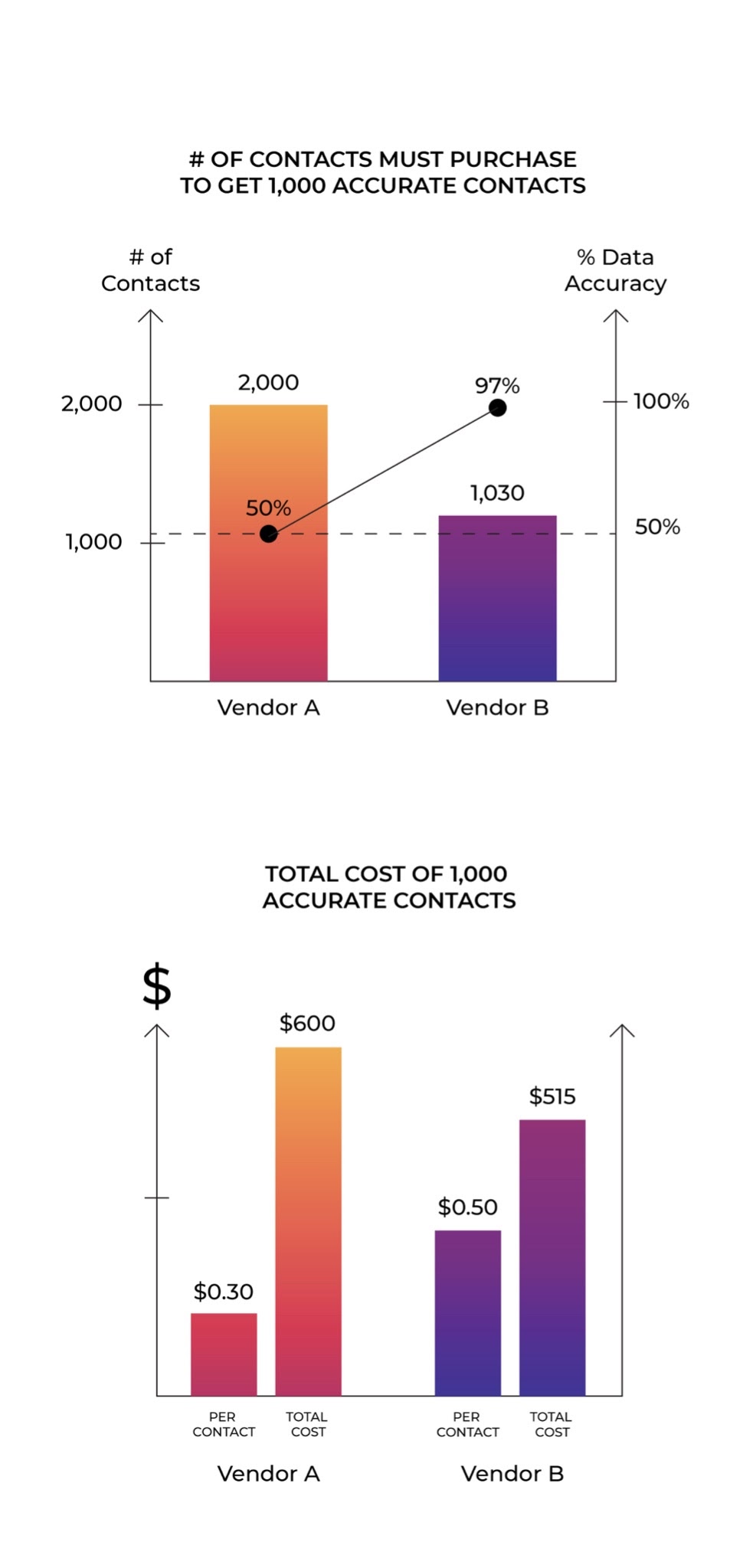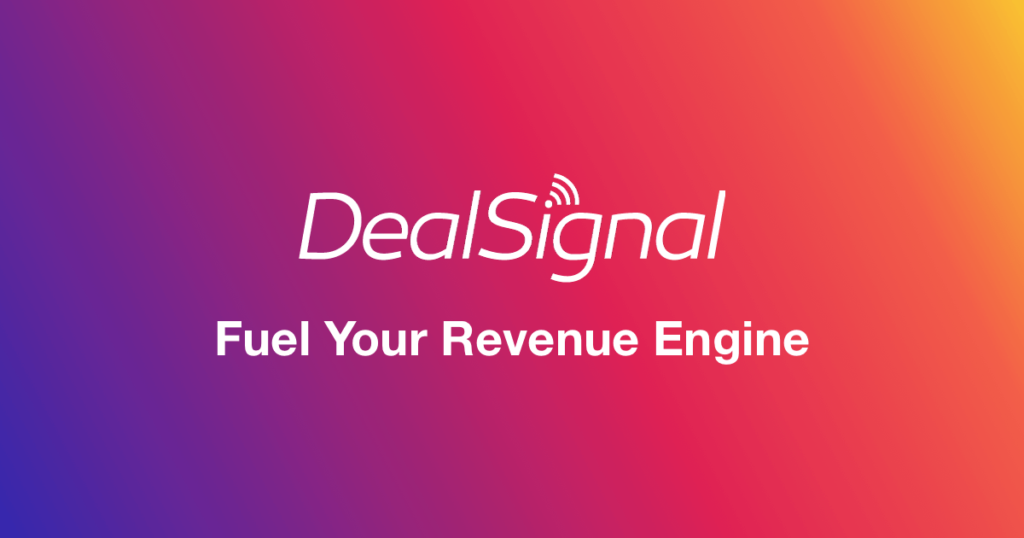Research shows that 70% of CRM data is outdated, incomplete, or inaccurate—and most B2B data providers you entrust to solve your data gaps offer on average 50% accuracy.
- Capturing Accurate B2B Contact Data
- The Problem With Third-Party Databases
- New, Verified Data Platforms
- Improving Compliance with Data
- Data Accuracy Impacts Your Total B2B Data Acquisition Costs
- The Impact of Real-Time Data on B2B Marketing Success
- Win More Deals With Fresh, Accurate, and Verified Data
- Learn More About B2B Contact Data Accuracy

Capturing Accurate B2B Contact Data
Contact data is a constantly moving target—and when you’re off-target, you can see big drops in team efficiency. For every email sent to an outdated email address or call made to an old phone number, how much time does your sales rep waste? Research shows that sales representatives lose approximately 500 hours (that’s equal to 62 working days) per year from using bad prospect data.
The accuracy levels of basic contact details, like phone, email, and job title, have a big impact on sales and marketing teams’ efficiency and performance—but capturing accurate data can be a challenge. Here’s a breakdown of just a few things that change on an annual basis:
- 60% of people change job functions within their organization
- 21% of CEOs change companies
- 23–30% of email addresses become outdated
- 18% of telephone numbers change
- 20% of postal addresses change
With this data in mind, it’s not out of the realm of possibility that nearly all of your current data can become inaccurate over the course of a few years. This is why it’s so important to refresh and re-verify your data on an annual basis at a minimum—a more frequent cadence, like monthly, is even better.
The Problem With Third-Party Databases
If you’re using a third-party data vendor, you might think that all of your data hygiene problems are solved. While a data vendor can certainly help, many use outdated technologies that overpromise and underdeliver.
For example, the more popular data vendor solutions on the market today operate as B2B contact databases, where you gain access to a database filled with millions of B2B contact records. Most of these databases house somewhere in the range of 200 million B2B contacts—so paying for access seems like a great deal.
However, it’s not physically feasible to update each and every contact record on a monthly, quarterly, or even annual basis. If you have a database of 200 million records, it would take 72 years to update every record—even if it took just one second per record to update.
So instead of updating and verifying every single contact record in a database, most data vendors carefully select a manageable subset that is based on historically popular requests, hot industries, or preferred job titles (like C-level positions). They will use multiple verification methods to make sure that subset is as accurate as financially feasible.
So although a small subset of contact records may be more accurate, the contact data you actually need might not fall into that chosen subset. And while a data vendor can talk to you about the latest and greatest methods they use to ensure data accuracy, their overall database won’t necessarily have the high accuracy rate you were promised.
New, Verified Data Platforms
Realistically, your team doesn’t need or will ever need 200 million contact records. Instead, you need verifiable contact details from a specific group of people. A more realistic number of contacts you may want to target could range anywhere from 1,000 to 10,000 contacts per month.
This is where new AI-driven data platforms that offer verification on demand, like DealSignal, can level up your game. Rather than housing millions of contact records you don’t need, we work on a made-to-order model.
This is how it works: You create a list of target contacts based on a set of target criteria, for example, intent, title, function, industry, etc. In most cases, to make this list actionable, you would typically need the contact’s direct phone number, mobile number, both work and personal emails, social media links, title, and department. From there, we’ll deliver back a fully verified and enriched list. So instead of gaining access to a database filled with inaccurate and unverified contact information, you can get a custom list delivered to you—fully verified meeting at least 97%+ accuracy.
Improving Compliance with Data
In today’s highly regulated business landscape, adherence to various regulations is of paramount importance for any organization. Failure to comply with these regulations can have severe consequences, including hefty fines, legal issues, reputational damage, and strained customer relationships.
Maintaining the highest quality data plays a vital role in ensuring compliance. Data accuracy is a cornerstone of regulatory compliance as it enables businesses to meet the requirements set forth by governing bodies. By maintaining accurate and up-to-date data, businesses can demonstrate their commitment to following regulations and safeguarding sensitive customer information.
Regulations governing data privacy, such as the General Data Protection Regulation (GDPR) and the California Consumer Privacy Act (CCPA), place stringent requirements on businesses when it comes to handling and protecting personal data. These regulations demand organizations to have accurate records of customer consent, provide transparency in data collection practices, and implement robust data security measures.
It’s worth noting that regulations are not static but rather constantly evolving. Governments and regulatory bodies regularly introduce new laws or modify existing ones to address emerging privacy concerns and technological advancements. To stay compliant, businesses must adapt and evolve with these changing regulations.
Maintaining data accuracy and quality requires a proactive approach. It involves implementing robust data governance practices, employing data validation and verification techniques, conducting regular audits, and staying informed about regulatory updates. By doing so, businesses can mitigate compliance risks, build trust with customers, and establish a solid foundation for long-term success in an increasingly regulated business environment.
Data Accuracy Impacts Your Total B2B Data Acquisition Costs

When comparing B2B contact data pricing, it’s important to consider that not all B2B data is equal. It’s easy to become enticed with a lower cost per contact and compare largely on price. But when you factor accuracy into your overall spend, you uncover true numbers.
For example, let’s say you need 1,000 contacts per month and are choosing between Vendor A and Vendor B. Vendor A charges 30 cents per contact while Vendor B charges 50 cents per contact. At first glance, Vendor B seems much more expensive. But when you factor in data accuracy, you uncover the true costs.
Vendor A
- Delivers at 50% accuracy
- Charges $0.30 per contact
After buying 1,000 contacts, you’ll realize that nearly half are bad. To meet your goal of reaching 1,000 contacts per month, you’ll need to buy another 1,000 contacts. That’s 2,000 contacts for a total of $600.
Vendor B
- Delivers at 97% accuracy
- Charges $0.50 per contact
With 97% accuracy, you would only need to buy 1,030 contacts to hit your 1,000 contact goal. At a total of 1,030 contacts, that’s $515 per month.
Even though Vendor B costs 60% more per contact, their 97% data accuracy means you spend $85 less overall, and save 16.5% in total cost!
Let’s also mention you would be avoiding wasting precious time using inaccurate data for 1,000 contacts. The opportunity cost of inefficiencies within your team, when you deal with inaccurate data, can reduce your sales and marketing team’s effectiveness by 30% to 50%! Your sales team wastes time reaching out to 1,000 bad contacts per month (usually with multiple attempts), and marketing teams risk more email bounces and even becoming blacklisted for poor email deliverability.
The Impact of Real-Time Data on B2B Marketing Success
Real-time data provides up-to-the-minute insights into customer behavior, preferences, and market trends, enabling marketers to make more informed decisions and react swiftly to changes. With real-time data, B2B marketers can enhance personalization, targeting, and engagement strategies by delivering relevant content and offers at the right moment. This agility not only improves customer experience but also maximizes conversion rates and ROI. Moreover, real-time data helps in identifying emerging opportunities and threats, allowing businesses to stay ahead of the competition and continuously optimize their marketing efforts. Integrating real-time data analytics into B2B marketing strategies is essential for achieving higher accuracy, efficiency, and effectiveness in today’s fast-paced digital landscape.
Win More Deals With Fresh, Accurate, and Verified Data
Poor data accuracy can have big ramifications for your sales and marketing teams. Don’t let this one piece of the puzzle cost you thousands of hours in lost time and thousands in missed opportunities. To see how fresh, accurate, and verified data can support your sales and marketing teams and win more deals, contact us for a personalized demo.

Dynamic B2B Data On-Demand. Transparent Pricing. Market-Leading Customer Support.
Learn More About B2B Contact Data Accuracy
- Data Accuracy & Coverage: Why DealSignal is the #1 Zoominfo Competitor
- Accuracy Matters: Why You Should Look Into ZoomInfo Alternatives
- Lead Enrichment: How to Streamline and Get the Most Out of Your Customer Data
- Intent Data: How to Use it to Generate Quality Sales and Marketing Leads




